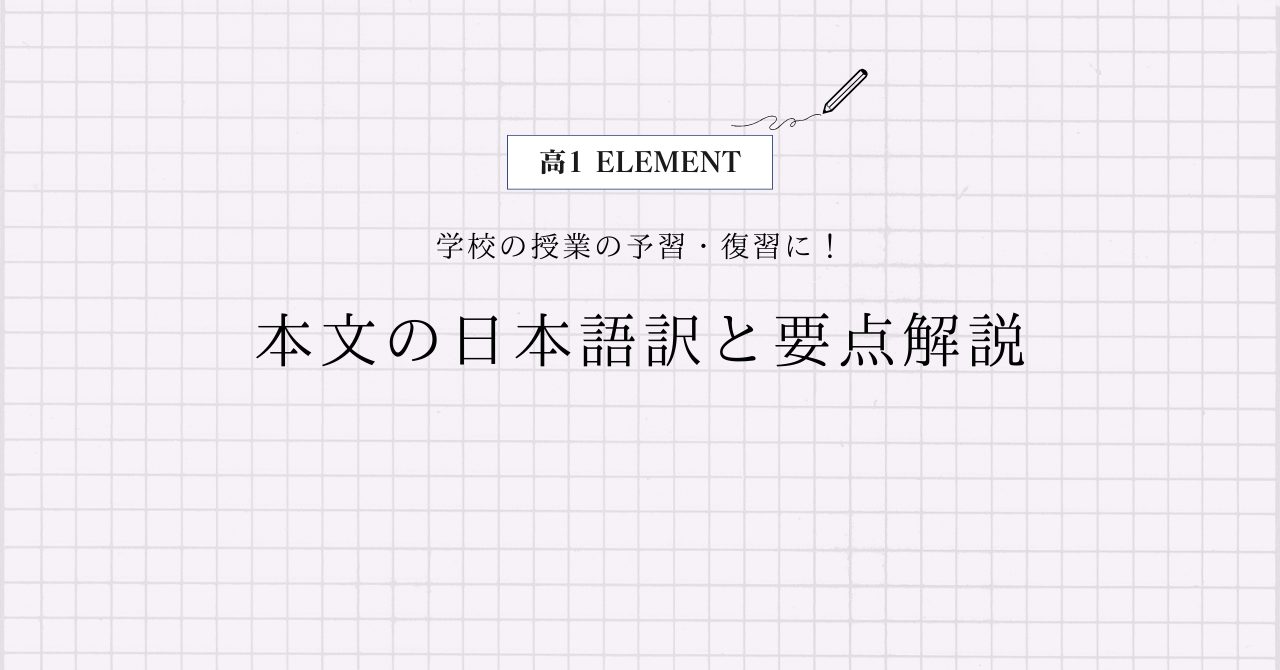三省堂 高1ELEMENT Lesson2 Section1の本文の日本語訳と重要箇所の解説です。
Lesson2-2, 2-3, 2-4の解説はこちらからご覧ください。
>高1ELEMENT Lesson2 Section2 本文和訳
>高1ELEMENT Lesson2 Section3 本文和訳
>高1ELEMENT Lesson2 Section4 本文和訳
- ELEMENT Lesson2 Section1 本文と日本語訳
- ELEMENT Lesson2 Section1 重要事項の解説
- Christian the Lion
- Shoppers filled a big London department store one day in 1969.
- John and Ace shared a house in London.
- At that time they were shopping for Christmas presents to send to their families in Australia.
- While they were shopping, they found a small cage with a baby lion in it for sale!
- “I’ve never seen a lion in a department store!”
- Ace cried out in surprise.
- The baby lion was cute, but it looked really sad.
- They felt sorry for the lion in such a small cage.
- Finally John said, “Let’s buy him.”
- ELEMENT Lesson2 Section1 まとめ
ELEMENT Lesson2 Section1 本文と日本語訳
Christian the Lion
「ライオンのクリスチャン」
Shoppers filled a big London department store one day in 1969.
「1969年のある日、ロンドンの大きなデパートは買い物客でいっぱいでした。」
John and Ace shared a house in London.
「ジョンとエースはロンドンで同居していました。」
At that time they were shopping for Christmas presents to send to their families in Australia.
「その時、彼らはオーストラリアにいる家族に送るクリスマスプレゼントを買い物していました。」
While they were shopping, they found a small cage with a baby lion in it for sale!
「買い物をしている最中に、彼らは赤ちゃんライオンが入った売り出し中の小さなおりを見つけました!」
“I’ve never seen a lion in a department store!”
『デパートでライオンを見たことはないよ!』
Ace cried out in surprise.
「エースは驚いて叫びました。」
The baby lion was cute, but it looked really sad.
「その赤ちゃんライオンはかわいかったのですが、とても悲しそうに見えました。」
They felt sorry for the lion in such a small cage.
「彼らはそんな小さなおりに入れられているライオンがかわいそうだと思いました。」
Finally John said, “Let’s buy him.”
「最終的にジョンが、『このライオンを買おう。』と言いました。」

ELEMENT Lesson2 Section1 重要事項の解説
Christian the Lion
「名前 the 名詞」という形で、「~の名前」という意味になります。「名詞」には「職業・種類」が入ることが多いです。
今回は「ライオンのクリスチャン」となりますね。
Shoppers filled a big London department store one day in 1969.
“shopper”は「買い物客」、“department store”は「デパート」という名詞で、“one day”は「ある日」という表現ですね。
“fill”は「を満たす」といった動詞なので、直訳すると「買い物客がデパートを満たしていた」となります。
ただ、変な日本語になるので、今回は「デパートは買い物客がいっぱいだった」と訳しました。
ちなみに「デパートは」が主語になるように書き換えると、“A big London department store was filled with shoppers one day in 1969.”となります。
“be filled with~”で「~でいっぱいだ」という重要表現なので、合わせて覚えておきましょう!
John and Ace shared a house in London.
“share a house”は「同居する」という意味になります。
At that time they were shopping for Christmas presents to send to their families in Australia.
“at that time”は「その時、その当時」といった表現になります。
“they”と“their”は“John and Ace”を指していますね。
“shop”は「買い物をする」という動詞で、“shop for~”で「~を買い物する」という意味です。また、ここでは「過去進行形」になっていますね。
“send”は「を送る」という動詞で、“to send”は「不定詞の形容詞的用法」として“Christmas presents”を修飾しています。
While they were shopping, they found a small cage with a baby lion in it for sale!
“while”は「~の間、最中」といった接続詞です。
“they”は“John and Ace”を指していて、この文も「過去進行形」になっていますね。
“found”は“find(を見つける)”の過去形で、“cage”は「おり、かご」といった名詞です。“it”も“a small cage”を指しています。“baby”は「赤ちゃんの」という形容詞になります。
“with”は前置詞で「~と一緒に」と訳すことが多いですが,必ずしも後ろに人が来るわけではありません。イメージとして「~とセットで」と覚えておきましょう。
“for sale”は「売り出し中で」という表現になります。
“I’ve never seen a lion in a department store!”
この文では「現在完了の経験用法」が使われていますね。
Ace cried out in surprise.
“cry out”は「叫ぶ、大声をあげる」、“in surprise”は「驚いて」といった表現になります。
The baby lion was cute, but it looked really sad.
“first”は「最初の、初めての」という形容詞で、“trip”は「旅行」、“steamship”は「蒸気船」という名詞です。
“be to 場所”で「~に行く」といったニュアンスの意味になります。
この“by”は「交通手段」を表していますね。“by”にはいろいろな意味があるのでいかに簡単にまとめておきます。
They felt sorry for the lion in such a small cage.
“they”は“John and Ace”を指していますね。
“felt”は“feel(感じる)”の過去形で、“feel sorry for~”で「~をかわいそうに思う」という表現になります。
“such”は「そのような」という形容詞で、“such a 形容詞 名詞”の順番で「そんな~な名詞」という意味です。語順に要注意です!
Finally John said, “Let’s buy him.”
“finally”は「最終的に、ついに」という副詞です。
“Let’s 動詞の原形”は「~しましょう」ですね。
同じ意味で“Shall we~?”や“Why don’t we~?”もあるのでセットで覚えましょう!
ELEMENT Lesson2 Section1 まとめ
以上がELEMENT Lesson2 Section1の日本語訳となります。
>高1ELEMENT Lesson2 Section2 本文和訳
>高1ELEMENT Lesson2 Section3 本文和訳
>高1ELEMENT Lesson2 Section4 本文和訳
何か分からない点や他に解説してほしい点があれば,お気軽にコメントしてください!


コメント